Metal Price News - October 2024

Investors still have their eyes fixed on the US and China economies. The US is doing better than feared, while China is still trying to get back up to speed.
Macroeconomic developments
USA
On September 18, the US Federal Reserve (FED) decided to cut interest rates by 0.5% - the first interest rate cut in 4 years.
The purpose of the interest rate cut was to create a smoother transition from boom to recession and soften the blow.
However, after the interest rate cut, new employment figures have been released. They show that employment is increasing far more than expected. This means that the economy is further away from a recession than the central bank had expected. As a result, we expect fewer interest rate cuts in the near future.
Overall, these movements have strengthened the dollar, and metal prices are holding up.
China
China is still struggling to maintain momentum.
The latest figures show that consumer inflation has fallen more than expected. This means that Chinese consumer demand is lower than the domestic supply of products.
In the first quarter of 2024, China’s GDP grew by 5.3%. In the second quarter, growth was relatively lower at 4.7%. To add to the problems, the housing market is still under pressure and exports are falling.
These factors are pushing commodity prices downwards because demand is low.
On the Wednesday before Golden Week – a Chinese holiday – the Chinese government announced a bailout plan to boost consumption.
Europe
Several European economies are still struggling with economic growth. The German economy has been struggling for a long time and continues to suffer.
France and Italy have also started to show slowing growth.
The European Central Bank (ECB) will likely cut interest rates by 0.25% at their meeting tomorrow, October 17, to mitigate the slowdown.
The European situation weakens the EUR against the USD.

Copper
The bailout plan in China initially sparked a rise in the copper price from about USD 9,700 to about USD 9,900 (the cash price).
However, the price fell again when the details of the aid package were presented. The market had expected a bigger capital injection.

Aluminium
The aluminium price increased from approximately USD 2,560 to USD 2,670 (LME 3 months) when the Chinese bailout package was announced.
Unlike copper, aluminium has more or less remained at the high level.
Aluminium is generally less price sensitive at the moment because of supply chain issues. There are problems with the production of alumina, which is the raw material used to produce aluminium.

Stainless steel
The alloy surcharge is expected to increase 3-4% across the board in November.
We expect to see this development for the rest of the year, and the mills will likely keep trying to raise prices.
But the decisive factor will be whether demand is large enough. This is especially true for sheets/plates, which are more price sensitive than bars.
Sheets/plates
Prices have stopped falling for now. A bottom level has been found, and the expectation is that the mills will try to push prices up a bit as the alloy surcharge increases. We expect moderate increases all around.
But the question is whether the market is right for increases - activity is low.
Bars
The price is starting to creep upwards because the alloy surcharge is increasing. But again, the question is whether the market will accept the higher prices.
Nickel
The nickel price is the culprit behind the alloy surcharge and thus the price movements.
China’s economic struggles are a major factor in the price surge. Generally speaking, demand for nickel is lower than the supply, and this price level is not likely to last.





















